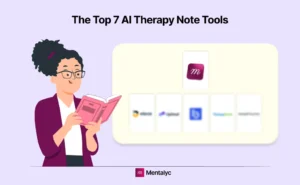The Cures Act (short for the 21st Century Cures Act) Psychotherapy Notes was signed into law in December 2016. Some of the sections of this law are more pertinent to the work of psychotherapy than others. We want to pay attention to aspects of the delivery of care, including information on leveraging electronic health records to improve patient care, empowering patients, and improving patient access to their electronic health information.
An important part of the Cures Act for therapists is about information blocking. Cures define info-blocking as “business, technical, and organizational practices that prevent or materially discourage the access, exchange, or use of electronic health information (EHI).” The Cures Act makes sharing electronic health information the expected norm in health care by authorizing the Secretary of Health and Human Services to identify “reasonable and necessary activities that do not constitute information blocking.”
That means patients will begin to get on-demand access to certain information within their medical records, including clinical notes, test results, and medications. You may have already noticed this taking shape from your own healthcare providers, especially if they are attached to a larger hospital system. Many now routinely have patient portals where your information about upcoming visits, billing, and clinical records can be easily accessed.
All healthcare providers are expected to comply with the Cures Act, including mental health professionals. It really only applies to electronic health information. If you are using paper records, it will not apply to you. At the same time, using paper charts doesn’t exempt providers from complying with patients’ rights to access their own records.

New! Transfer your notes to EHR with a single click. No more copy-pasting.
The Health Insurance Portability and Accountability Act (HIPAA) of 1996 already give patients the legal right to review their medical records. The main goal of Cures here is to actively involve and inform clients in their own care and help providers coordinate care more efficiently.
Psychotherapy and Note Sharing
There is more research being done on the benefits of sharing the therapy notes openly with clients. This study, for example, Sharing Clinical Notes in Psychotherapy: A New Tool to Strengthen Patient Autonomy, concludes that “open notes should be reconceived as a tool with the potential for ethical functionality- one that has the capacity to strengthen patient autonomy.” Other research suggests similar outcomes. The Cures Act has prompted the widespread realization that the benefits of sharing notes with clients could well outweigh the risks, even in psychotherapy.
How can sharing notes help clients?
While therapists’ fear of sharing notes in psychotherapy is a common and understandable concern, the emerging research demonstrates a more optimistic view. In health systems where practitioners have already piloted transparent note-taking practices, there seems to be an overwhelmingly positive response. Both clients and providers report benefits like empowerment to address mental health issues proactively, reducing the stigma associated with treatment, and enhancing the therapeutic alliance.
For some clients, access to the notes can even serve to extend the life of the therapy session between visits. It can serve as a tool that empowers clients to review what was said to ensure its accuracy or as a reminder of important “takeaways” or “homework” recommendations from the therapist.
This actually does make sense from the practitioner’s viewpoint. How many times have you asked a follow-up question from the previous week’s session and the client forgot entirely about what they were supposed to do? If your experience has been anything like mine, the answer is A LOT.
Should I change the way I’m taking notes?
Long before laws like the Cures Act took effect, therapists have generally been guided to write notes as if a client or other concerned party were going to read them. In graduate school, I recall being repeatedly told things like “Write as if your note were to be read aloud by a judge or jury.” This was not intended as a scare tactic as much as it was a call to action to give succinct and accurate information that is pertinent to the client and the work you are doing. As of the time of this writing, there has not been guidance set on a specific format for note-taking under the Cures Act.
As transparency and note-taking become a more integral part of healthcare delivery, this can create additional stress or anxiety for new and seasoned clinicians alike. The work of therapy itself is already quite exhausting, let alone having to ace the way it is documented.
It’s worth mentioning that tools like Mentalyc’s AI scribe can remove the bulk of this additional work and worry. Mentalyc is HIPAA compliant and transcribes therapy sessions into organized bullet points and clinical insights in less than two minutes. You always have the autonomy to edit or delete aspects of the note to your clinical (or client’s) preferences, making it an easily transparent bookend of the therapy hour.
For those interested in learning more about The Cures Act law, you can find the entire 312-page document here: https://www.congress.gov/114/plaws/publ255/PLAW-114publ255.pdf
For more guidance and research information on this topic for mental health professionals, I’d recommend visiting Open Notes – an organization advocating for greater transparency in healthcare. https://www.opennotes.org/mental-health-professionals/
Disclaimer
All examples of mental health documentation are fictional and for informational purposes only.
Why other mental health professionals love Mentalyc

“A lot of my clients love the functionality where I can send them a summary of what we addressed during the session, and they find it very helpful and enlightening.”
Therapist

“By the end of the day, usually by the end of the session, I have my documentation done. I have a thorough, comprehensive note … It’s just saving me hours every week.”
CDCII

“Having Mentalyc take away some of the work from me has allowed me to be more present when I’m in session with clients … it took a lot of pressure off.”
LPC

“It’s so quick and easy to do notes now … I used to stay late two hours to finish my notes. Now it’s a breeze.”
Licensed Professional Counselor






